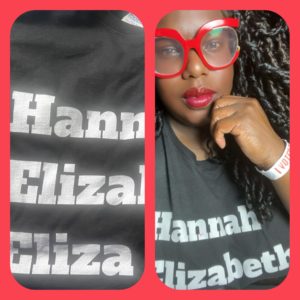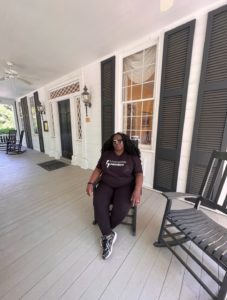Election Reflection from Hannah Drake
I read the names on my shirt once more before heading to my polling station. Hannah, Elizabeth, Eliza. Nettie, Belle. I was not stepping into the election booth alone. I was taking the spirit of women in my family who were enslaved in America, women who probably never imagined this day. It had been a journey to find their names. However, I imagine they were always with me, guiding me, leading me to find not just them but the names of other Black people whose names were erased from history.

I recall visiting one of the plantations where my great great great grandparents Hannah and Warren Lorick were enslaved in South Carolina before Hannah was given away as a wedding gift and taken to Mississippi, effectively ending their union. I sat in the huge rocking chair on the porch, where I imagined Hannah would have never been allowed to sit and enjoy a moment of leisure as the cool breeze from the trees blew across her face. I closed my eyes and imagined she was there. We would converse, her asking me, “Tell me about America now. Tell me: what has happened since I was born in 1825? What have you all done in almost 200 years?”
Her questions make me pause. Where do I even begin? There is so much that I can tell her about so many Black people who have made a difference throughout history.
Women like Fannie Lou Hamer, who dedicated her life to civil rights. I could tell her about Dr. Martin Luther King Jr., a civil rights activist who dreamed of a better world. I could tell her about the 44th President of the United States, a Black man named Barack Obama, or about Kamala Harris, who became the first Black woman to be the United States Vice President and the Democratic nominee for President. There were so many stories I could tell her about Black people who have helped shape America.
But deep in the pit of my stomach was this ball of darkness making its way up to my throat, where it rested, forcing me to swallow hard. In as much beauty as I could tell her about America, there was still so much ugliness.
That is the dichotomy of humanity.
In all its wonder and splendor, there are often two sides. We exist in the yin and the yang, two opposing but complementary forces constantly interacting to create a dynamic system, trying to maintain our equilibrium. The darkness is met with light. The light fighting not to be consumed by the darkness.
I had to be honest with her and tell her that the man who fought hard for justice, who imagined a world where his children could live free, was shot to death as he stood on a balcony at the Lorraine Motel. I had to tell her that for all the work Fannie Lou Hamer did, “she would die at age fifty-nine, officially from cancer and heart disease, but really from being poor, Black, and an activist in Mississippi at a time when all of that was lethal.” (Roaslaind Early) I had to tell her about 4 little girls who were killed in a church bombing. I had to tell her that almost 200 years later, there are still towns where Black people feared the sunset. I had to tell her about Ahmaud Arbery, who was killed while jogging, and Breonna Taylor, who was killed in her home by the people sworn to protect and serve her.
It crushed me to imagine telling her that after hundreds of years, we still find ourselves walking around the same mountain. I wanted to tell her everything was perfect and that we realized who we could be when we treated everyone with dignity, but I couldn’t. For every moment of light, the darkness was there to meet us.
But then, as I rocked in the chair, I thought, “I am here.” And not only am I here, but my daughter is here. We prove that Hannah’s and Warren’s lives and sacrifices were not in vain. I am thankful for them because they planted seeds in the ground hundreds of years ago, and here I am today.

I was reminded of 2020, a year that is etched in all our minds. A year where we were surrounded by uncertainty and hopelessness. I wanted to put some beauty in the world, so I decided to create a Freedom Garden filled with pink lilies. I planted several bulbs and waited.
Nothing grew.
I decided it must be what is underneath the soil – old roots – and they must be dug up. I started digging and clearing the area, pulling up roots that had been embedded in the soil years ago. And I planted more seeds, believing this time would be different.
It wasn’t.
Another year and nothing to show for it. No lilies in 2020, 2021. Surely, in 2022, it would work. I bought fresh soil. I planted more seeds. I had done everything right.
And nothing grew.
I was angry. I decided nothing could grow here in this barren land, so I just covered it all with rocks. I poured bags of white and red stones over the Freedom Garden and convinced myself to never think of it again. Perhaps nothing good can ever grow here.
Then, one day in 2023 – three years later – I was walking to my car, and out of the corner of my eye, I saw what looked like a stem. A stem that managed to make its way through the soil and the rocks, breaking through my disbelief. And every day, more stems came through, then bulbs, and finally huge pink petals. The Freedom Garden was filled with pink and white lilies, even more than I had planted. It reminded me in my darkest hour to keep planting seeds.
When it seems hopeless: keep planting seeds.
When you want to give up: keep planting seeds.
When it seems you are surrounded by darkness: keep planting seeds.

I do not know what tomorrow holds. I do not know what the next 4 years hold. However, I do know our work through (Un)Known Project is to keep planting seeds so that people like my great great great parents Hannah and Warren Lorick and the countless other men, women, and children who were enslaved in America will never be forgotten.
That is the job of (Un)Known Project, and our job as we work in community together: to keep planting seeds.
As we look toward 2025, I invite you to plant a seed of hope in (Un)Known Project today. Just like it takes seasons and nourishment for plants to flourish, it takes community support to create spaces of remembrance and healing.
A gift of $10 or more today can plant the seeds of tomorrow. If each person reading this supported the work in this way, knowing what we may face on the horizon, we’d be able to raise $30,000 to ensure (Un)Known Project impacts generations to come.
Becoming a $10 monthly donor sows even more seeds!
Keep planting!
Hannah Drake